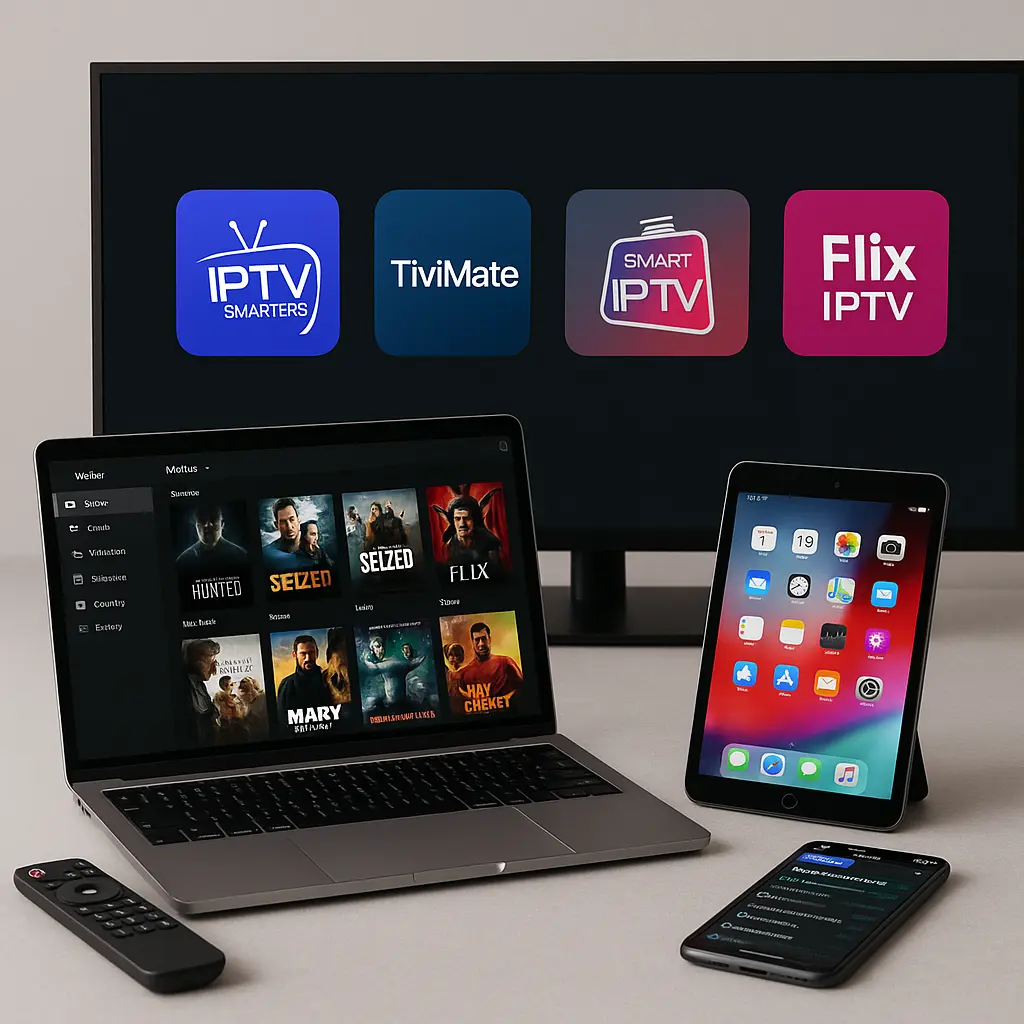IPTV Crack Evolution with Docker: Understanding the Rise of Containerized IPTV Setups
What is IPTV Crack Evolution Docker?
The term IPTV Crack Evolution Docker refers to the rise of cracked IPTV services running inside Docker containers — a lightweight, flexible virtualization tool. Over the years, IPTV piracy has evolved from basic hacked playlists into fully automated server panels using Docker to deploy cloned versions of Xtream Codes and other IPTV management systems. This evolution allows IPTV crackers to hide their servers, scale faster, and bypass ISP blocks more easily. Docker-based IPTV setups are now a common method used by underground IPTV providers to manage, deliver, and stream pirated content worldwide. Understanding this shift is essential for anyone following IPTV technology, cybersecurity, or content protection trends.
🔥 Premium IPTV – Worldwide & Adult Channels
Enjoy 10,000+ Live TV Channels, Movies & Sports. Works on Firestick, Android, Smart TV & more. Fast setup, no buffering!
| Plan | Duration | Price | Order |
|---|---|---|---|
| Basic | 1 Month | $20 | Order 1 Month |
| Standard | 3 Months | $30 | Order 3 Months |
| Pro | 6 Months | $40 | Order 6 Months |
| Ultimate | 12 Months | $60 | Order 12 Months |
| Extended | 24 Months | $90 | Order 24 Months |
| Lifetime | One-Time | $299 | Order Lifetime |
📧 Email: [email protected]
The Evolution of IPTV Cracking: From Simple Hacks to Smart Containers
In the early days of IPTV cracking, most illegal streams came from shared M3U links or public servers with minimal security. As IPTV grew in popularity, so did the complexity of cracking methods. Hackers began targeting IPTV panels like Xtream Codes, exploiting vulnerabilities to access full channel lineups, user databases, and server configurations.
Over time, IPTV piracy became more organized — moving from hobbyist-level hacks to full-blown businesses. This shift demanded more reliable and scalable infrastructures, which led to the adoption of Docker containers. With Docker, IPTV crackers could replicate servers, automate backups, and run multiple instances discreetly — making it harder for authorities to detect or shut them down.

How Docker Changed IPTV PiracWhy This Matters for Legal IPTV Providers & Developers
The rise of Docker-powered IPTV crack setups poses a serious threat to legitimate IPTV businesses, broadcasters, and developers. As cracked panels and illegal streams flood the market, it becomes harder for paying users to differentiate between legal services and pirated copies. This hurts the reputation of trustworthy providers and leads to lost revenue across the industry.
For developers, especially those working on IPTV apps or backend systems, Docker-based piracy highlights the importance of security-first development. Panels must be hardened against container cloning, and APIs should be protected with rate limiting, proper authentication, and encryption. Legal IPTV services should also actively monitor for leaked streams or unauthorized usage of their infrastructure.
Governments and content protection agencies are increasingly focused on shutting down these Docker-based IPTV crack networks. Still, due to the decentralized and rapidly deployable nature of containers, enforcement remains challenging. This makes it even more critical for legitimate IPTV companies to educate users and promote secure, legal alternatives.y Forever
Docker brought a revolution to how IPTV piracy operates. By allowing IPTV servers and cracked panels to run inside isolated containers, Docker made it easier for pirates to deploy, scale, and hide their illegal operations. A single VPS can now host multiple IPTV environments, each running in a self-contained Docker image — making tracking, banning, or even detecting these services much harder for ISPs, governments, and anti-piracy groups.
Pirates often use cloned Xtream UI panels or modified IPTV server software inside Docker, pre-configured to stream thousands of channels. With just a few lines of code, anyone can launch a full IPTV service — no technical skills required. This has lowered the barrier to entry and created a wave of small, unlicensed IPTV providers around the globe.
Additionally, Docker enables auto-recovery and migration, meaning if a panel is shut down, it can be redeployed on a new server within minutes. This flexibility is why many illegal IPTV sellers now rely on Docker to power their backends securely and efficiently.

Common Tools and Panels Used in IPTV Docker Setups
Pirates running IPTV crack operations via Docker typically rely on a handful of well-known tools and software stacks. At the heart of most setups is a cloned or nulled version of Xtream UI or its successor, Xtream Codes Reborn. These panels provide a full dashboard to manage users, streams, EPGs, and billing — often indistinguishable from the real thing.
To streamline deployment, many use Docker Compose scripts to launch the panel, MySQL databases, and streaming servers in one go. Some popular components seen in Docker-based IPTV setups include:
- Nginx/Apache – for load balancing and web interface access
- FFmpeg – for stream transcoding and conversion
- Flussonic or Wowza clones – used for advanced stream management
- MariaDB/MySQL – databases for user credentials, channel info, and logs
- Shell scripts – automated updates, backups, and IP filtering
There are also private forums and Telegram groups that distribute pre-built Docker IPTV images, enabling even beginners to launch services within minutes. Many of these setups come pre-cracked, allowing full access without a license, and even include fake “reseller” modules for resale operations.
This underground ecosystem has contributed to the rise of thousands of illegal IPTV operations worldwide, each operating from behind layers of Docker abstraction and VPN protections.
Legal Risks and the Future of IPTV Cracking
Running or using cracked IPTV services — especially those powered by Docker — carries serious legal risks. While Docker itself is legal and widely used in DevOps, its misuse to deploy pirated IPTV platforms is a direct violation of copyright laws in most countries. Authorities across Europe, the U.S., and the Middle East have ramped up enforcement, seizing servers, freezing domains, and even arresting operators behind large IPTV rings.
From a user standpoint, subscribing to illegal IPTV services can also result in fines, IP bans, or prosecution. More importantly, these cracked platforms are unregulated, which often leads to malware infections, stolen data, and credit card fraud.
Looking forward, IPTV piracy will likely continue evolving with more sophisticated containerized setups and encrypted distribution. But at the same time, tech companies and anti-piracy coalitions are adapting. Cloud hosting platforms are introducing tighter monitoring tools, and AI-based fingerprinting is helping to detect pirated streams in real time — even if they’re Dockerized.
For those in the IPTV space, staying informed about these tactics isn’t just about awareness — it’s about survival. Legal providers must double down on secure infrastructure, customer education, and clear branding to stand apart from these fast-moving piracy networks.
Choose Legal, Reliable IPTV with Kevin IPTV
As IPTV cracking becomes more sophisticated through tools like Docker and containerized servers, it’s more important than ever to choose a trusted, legal IPTV provider. While cracked IPTV setups may seem attractive due to low cost, they come with serious risks — including poor stream quality, sudden shutdowns, security breaches, and legal consequences.
That’s where Kevin IPTV stands out. We offer 100% reliable, high-quality IPTV subscriptions with over 19,000+ channels and VOD content, including sports, entertainment, news, and adult channels — all with full legal compliance and top-notch support. No Docker hacks. No shady servers. Just fast, smooth streaming across Smart TVs, Firesticks, MAG boxes, Android devices, and more.
Whether you’re looking for a 1-month IPTV plan, a lifetime subscription, or a fully branded IPTV reseller panel, Kevin IPTV has what you need. Say goodbye to cracked panels and unstable links — and stream safely with confidence.
👉 Explore our packages now: https://keviniptv.com/shop
📞 Need help choosing? Contact our support team 24/7 for expert guidance.
Frequently Asked Questions (FAQ)
What is IPTV cracking?
IPTV cracking refers to the illegal practice of bypassing authentication or licensing mechanisms to access premium IPTV content for free or resell it without authorization. This is often done through hacked M3U lists, cracked Xtream UI panels, or modified streaming servers.
How is Docker used in IPTV cracking?
Docker allows IPTV crackers to run full IPTV server environments in isolated containers. This enables quick deployment, hiding of IP addresses, automated scaling, and fast recovery if a server is taken down. It’s a powerful tool that pirates use to build stable but illegal IPTV platforms.
Are Docker IPTV setups legal?
No — while Docker itself is a legitimate software container tool, using it to deploy unauthorized IPTV services is illegal. It violates copyright laws and can lead to fines, criminal charges, and server seizures.
Why should I avoid cracked IPTV services?
Cracked IPTV services are risky. They often contain malware, deliver unstable streams, and can expose your personal data. More importantly, using or reselling pirated IPTV content is illegal in many countries.
What is the best legal IPTV alternative?
The best legal IPTV solution is Kevin IPTV. With affordable packages, worldwide coverage, adult options, sports, movies, and more — Kevin IPTV offers reliable, high-quality streaming without the risks of cracked services or Docker-based piracy.




